Revolutions Happen
On the Crisis of Neoliberalism and the Alternative of the Common
by Devon G. Peña
Revolutions happen. One has already started though many people are yet to recognize it. But they may already be participating in it and helping to bring alterNative[1] futures forward. The resurgence of the common is the revolution quietly unfolding around us  and through each of our relations and actions.
and through each of our relations and actions.
Here, I explore the enactment of a new social revolution the multitude (a.k.a. the 99%) is creating to ‘sublate’ (aufheben)[2] neoliberal capitalism in the spaces of direct material production and bio-politics, qua reproduction. The resurgence of the common is the underlying force driving a largely subaltern and protean process of revolutionary change.
It is through the agency of collaborative networks and their spaces of autonomy that we are disrupting the empire of the commodity form and threatening the stability and long-term survival of the neoliberal state of economic exception (Negri 2008). (more…)






